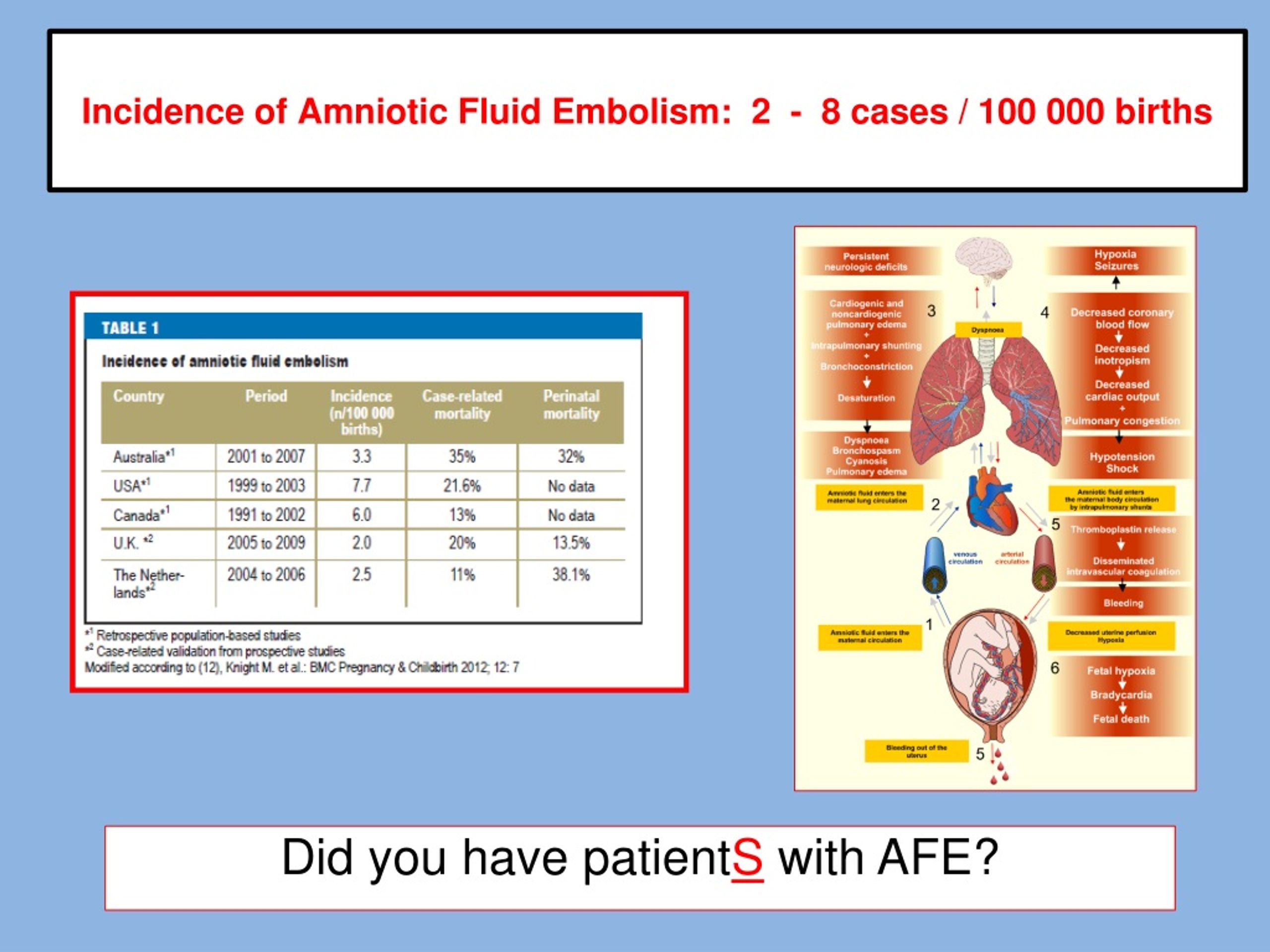

The current understanding of AFE pathophysiology includes fetal components obstructing maternal microvessels with subsequent anaphylactoid reaction. The incidence varies from 1.7-14.8 cases per 100,000 worldwide. Summary: Amniotic fluid embolism (AFE) is a rare catastrophic obstetric condition defined by clinical manifestations of pregnancy with sudden onset of cardiopulmonary arrest, consumptive coagulopathy or neurological deficits without other explainable illnesses. Original research, case reports, guideline recommendations, and review articles were reviewed in this study. Study design: A systematic literature review was performed using the PubMed database, restricted to articles published in English from 1992 to 2018. To help us celebrate our 50th year, we’ll share stories here that reflect HCA Healthcare’s mission – above all else, the care and improvement of human life – and our pledge to improve life and make history for the next 50 years and beyond.Objective: This article aims to review and provide more understanding of current knowledge of amniotic fluid embolism regarding pathophysiology, diagnostic criteria, risk factors, indicating biomarkers, treatment strategies and outcomes of some case reports. This year, HCA Healthcare celebrates its golden anniversary and the culture of caring established by our three founders 50 years ago. In 1968, HCA Healthcare was conceived by two physicians and an accomplished business leader - Dr.

HCA Healthcare internal audience can watch the video here. Meet Meghan and her husband, Jeff, as they retell the story from their perspective and share their care experience at Overland Park Regional Medical Center. From the initial labor and delivery staff to anesthesia to the ICU and OR teams to neonatology and the NICU staff to the lab and to the blood bank – the effort that this entire hospital put into the two of them that day was remarkable.”

“There were not many people in the hospital that didn’t know about these two because almost everyone was involved in their care. “Although this is not something we see every day, everyone knew what to do and worked together to save Meghan and her baby,” she added. “Surviving amniotic fluid embolism is being in the right place at the right time and around the right medical staff that can manage the emergency.” “There are not many places in the city that could’ve done what we did that day,” Dr. Meghan had a total of four surgeries and around 110 units of blood products in the first few days, trying to correct the lack of blood clotting – a complication of AFE and something the Overland Park caregivers were on alert and ready for. The benefit we have is typically, these women are young and healthy, and we can support them long enough to turn around this process.” “Most patients who suffer from AFE don’t make it through the first hour. “The maternal mortality rate of amniotic fluid embolism is approximately 80 to 90 percent,” Dr.

The rest of the day was spent treating Meghan and her baby and hoping they would survive. The healthcare team immediately wheeled Meghan to the operating room – at the time, not knowing what caused her heart to stop – delivered the baby within seconds and performed CPR, pushed medicines and resuscitated her. Weaver recalls that Meghan was progressing beautifully during labor when she suddenly sat up, said she couldn’t breathe and then she was gone. That’s exactly what happened to Meghan Jolliffe.ĭr. “A patient may report things like, ‘I don’t feel well’ or ‘something is wrong with me’ or ‘I can’t breathe,’ but it’s literally moments before their heart stops.” “There are occasionally some warning signs immediately prior, indicating, something we refer to in medicine as, a sense of impending doom,” she added. “One minute the patient is fine and the next, their heart is no longer beating.” Weaver, an OB-GYN at Overland Park Regional Medical Center in Overland Park, Kansas. “Amniotic fluid embolism is when some of the amniotic fluid from inside of the uterus gets into the maternal bloodstream and lung circulation and can cause cardiovascular collapse,” said Dr. A sense of impending doom is how Kristi Weaver, DO, describes what could be a potential warning sign of amniotic fluid embolism (AFE) – a rare but life-threatening condition that most commonly occurs during labor and delivery.


 0 kommentar(er)
0 kommentar(er)
